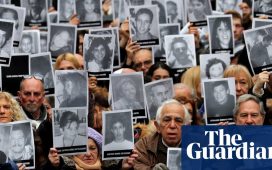Sydney Catholic and Anglican churches say they will not follow the example of the Uniting church, which has granted support to the school climate strike movement and given students support to attend the marches.
Students across the country are planning to walk out of school on Friday 20 September, to protest government inaction on the climate crisis. Thousands of Australian students participated in two previous strikes, which have since grown into a global movement of millions.
On Monday, the Uniting church’s NSW and ACT synod – which oversees the administration of nine Sydney schools – announced it would “use their voice and their networks” to support the latest protest.
“We need to listen and learn from young people,” the church said in a statement. “It’s their future that is at stake and their protests are genuine and informed and should not be ignored.”
But spokesmen for the Sydney Anglican diocese and Sydney Catholic Schools told Guardian Australia they would not go as far as the Uniting church.
Sydney Catholic Schools, which oversees 152 systemic schools, said it had to abide by the NSW education department’s guidance on the strikes.
“The NSW government is very clear in its expectation that during school hours, all students should be at school,” a spokesman said.
“While we are thrilled to see our students passionate about the environment, the best way for young people to really make a difference is to receive a quality education. This will provide them with the skills and knowledge to positively change the world as adults.”
A spokesman for the Anglican diocese of Sydney said: “Christians may disagree as to the wisdom of responding to government inaction on climate change in this way. This is a matter for individual schools and their students.”
Meanwhile, school strikers thanked the Uniting church for its leadership.
“Tackling the climate crisis demands action from all of us,” they said in a statement. “Unfortunately it has fallen to institutions and people outside of government to step up and fill the climate leadership vacuum left by our politicians.”
Uniting Church spokesman Reverend Simon Hansford said the decision was not binding and it will be up to individual schools to decide if they let their students attend.
“The reason we are acting in speaking out is we think it is an issue of faith,” he said. “Caring for our climate and humanity is a responsibility for us, from the first creation story. This is our responsibility as people of faith but also as human beings.
“Uniting and many other churches have been active in this space for decades,” Hansford added. “The Catholic bishops in South America have been calling for action on the fires in the Amazon.”
Hansford added that it was “not in our purview to tell anyone what to do. There is no question in my mind that there are students across Australia, in independent and government schools that are seeking to act on that day. But to reiterate, the actions of students are up to the students and parents and individual schools.”
But he said an overwhelming majority of the synod’s 360 members passed a resolution in July to offer support for the strikes. Adult employees of the Uniting church will also be allowed to take a long lunch, take personal leave or swap a shift to attend the rallies and protests.
In November last year, in the lead-up to the first climate strike, prime minster Scott Morrison told students to “go to school” and be “less activist”, while NSW education minister Rob Stokes told students in February before the second strike that “you can’t strike if you don’t have a job”.
On Monday, Hansford rejected criticism that the strikers were uninformed.
“I would suggest that action on anything like the climate crisis is a consequence of a high quality education,” he told Guardian Australia.
“My understanding of education is that we are training people to not only learn things at school, but to learn how to be leaders, how to be responsible, part of the community and active socially and politically.
“The history of adult responses to young people’s activism is to class them as uninformed, but these young people are informed and responding to the climate crisis.”





